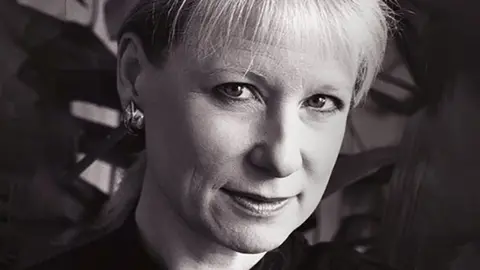Actress duped by friend in Hillary Clinton film scam
 Helena Breck
Helena BreckA woman has been jailed for three years for defrauding a former Eastenders actress out of money to fund a fake documentary about Hillary Clinton.
Anne Mulloy, 63, told her friend Helena Breck she needed her money for expenses and promised access to Clinton's 2016 US presidential campaign.
Ms Breck acted in an episode of the BBC soap opera in 1994. She also provided the voice for "unexpected item in the bagging area" supermarket check out messages.
The original charge claimed Mulloy of Fraserburgh, Aberdeenshire, carried out a £85,000 fraud, but this was amended by the Crown to an unspecified amount.
At Peterhead Sheriff Court, Sheriff Craig Findlater told Mulloy that custody was the only option after a longterm fraud that "exploited a friend" for financial gain.
Ms Breck told BBC Scotland News she was “extremely relieved that justice has finally been served”.
She added: “She has shown no remorse for the trust that she has abused, the pain she has caused, or the crimes that she commits.
“I’ll never recover financially from the damage that she has caused, but hope that others might be protected from this callous fraudster, at least for the time that she is in prison.”
In Eastenders Ms Breck played Elizabeth Willmott-Brown, the wife of Kathy Beale's rapist James Willmott-Brown.
She also had a recurring role in the 1980s BBC soap opera Triangle, set onboard a North Sea ferry.
'Sustained fraud'
Mulloy was found guilty of fraud between 2011 and 2017 by asking Ms Breck for loans for expenses which she had no intention of repaying.
One part of the pretence was that she was making a Hillary Clinton documentary, which did not exist.
Defence counsel Jordanna Blockley said Mulloy had significant health difficulties, and there was the option of a community sentence instead of jail.
However, Sheriff Findlater said she had been convicted of a sustained fraud involving tens of thousands of pounds, and had a history of similar offending.
The sheriff said only a custodial sentence was appropriate due to the scale of the fraud, the timescale involved, and the impact on the victim.
